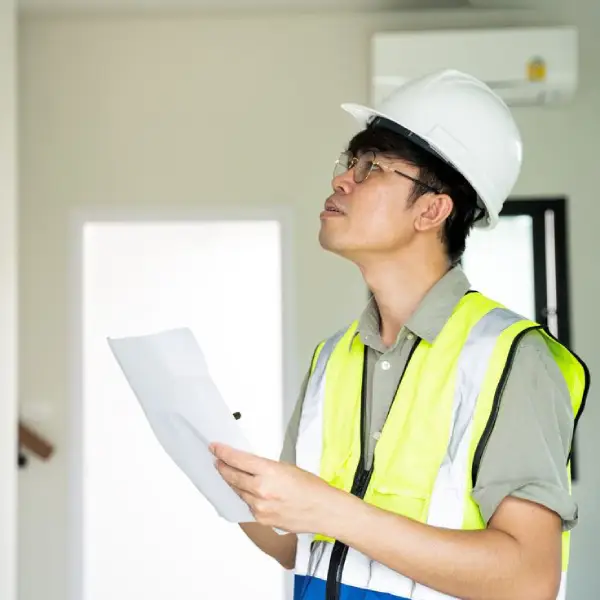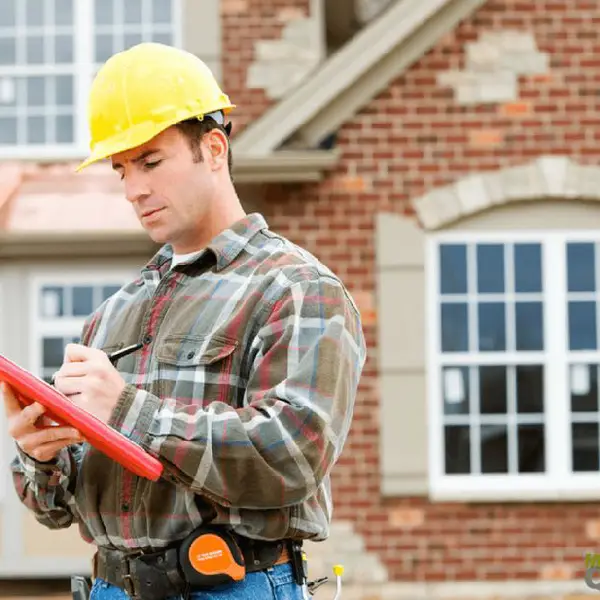All Benefits of Having a Home Inspection (For sellers and buyers)

Making educated judgments regarding a property's worth, safety, and maintenance requirements may be facilitated by being aware of the benefits of a home inspection for both buyers and sellers.
Below we have reviewed the 14 important inspection benefits you should know.
Before that, you should have complete knowledge about home inspection. Otherwise, click on what is home inspection article and find out about the basics of this process.
Benefits of Home Inspection for Sellers
For sellers, a house inspection has several advantages that may transform it from a possible barrier to a useful instrument that can speed up the selling process and increase your earnings.

image sourced from here
You as a seller can gain a lot from a pre-listing house inspection in the following ways:
1. Prevention of surprises (Uncovering potential issues)
A detailed examination uncovers hidden issues including cracked foundations, leaky roofs, and malfunctioning wiring.
You may rest easy knowing that you're showing prospective buyers a well-kept house if you take proactive measures to address these problems.
You may reduce the likelihood that buyers would drop their offer during negotiations or ask for repairs by taking care of such issues before listing.
2. Increased transparency to potential buyers
If you are wondering “Is a property inspection worth it”, we should tell you it is absolutely worth it due to the increased transparency.
During negotiations, it is beneficial to be honest with purchasers regarding the state of the house. It's among the many important advantages of a pre-listing house inspection.
A seller's inspection report establishes credibility with prospective purchasers by displaying transparency.
It might offer you a competitive advantage in the market and demonstrate your dedication to a seamless transaction.
Understanding the state of your house enables you to market and price it properly, drawing in serious purchasers who value a well-kept home.
3. Opportunity for repairs (Increased property value)
Following a house inspection, the buyer could occasionally ask the seller to make repairs or provide credits to fix any problems that were discovered.
This gives the seller a chance to take care of any required repairs prior to the transaction being completed.
Depending on the conditions of the purchase agreement and any applicable local real estate regulations, the repairs and discussions will take different forms.
It is imperative that the buyer and seller engage in open communication and collaborative efforts to reach a mutually agreeable agreement.
4. Enhanced marketability
Before marketing your house, you may take care of any possible problems that might turn off purchasers by having a comprehensive home inspection. This may boost buyer confidence and speed up the sale process.
The term "enhanced marketability following a home inspection" describes how appealing a house is to prospective purchasers following a comprehensive assessment.
A thorough house inspection and the timely resolution of any problems found will convince potential buyers that the property is well-maintained and in good shape, which will increase its attractiveness and marketability.
5. Faster Closing Process
Although not required, house inspections have a big influence on closing dates. One way to speed up the closing process is to swiftly address any concerns that are found.
One way to speed up the process is to schedule the inspection early and make sure you and the inspector are in good contact.
Further streamlining the inspection is possible by supplying the inspector with pertinent papers before.
Work with your real estate agent to negotiate repairs with the seller after receiving the inspection report, and then reschedule the closing date. Resolving problems quickly can help prevent closing-day delays.
6. Reduced negotiation stress
A home inspection might identify problems with a property that would need to be fixed or the asking price lowered.
You can guarantee a fair result and lessen stress by being aware of your rights and using smart negotiation techniques.
7. Legal protection
A house inspection can protect sellers legally and lessen the possibility that purchasers would sue them after the transaction.
Benefits of Home Inspection for Buyers
Before making a purchase, buyers can feel more at ease knowing that they have a thorough understanding of the property's condition thanks to a home inspection.
With this information, they can make wise choices and steer clear of future surprises or expensive repairs.

image sourced from here
Of course, home inspections for buyers offer other advantages that we have explored below:
1. Identify potential issues or defects
Before buying a house, purchasers should do a home inspection to find any potential problems.
The outside and interior of the house, as well as its HVAC, plumbing, electrical, and structural elements, will all be inspected by a qualified inspector. They will offer a thorough report detailing any flaws or problematic areas.
Problems include structural deterioration, bad wiring, plumbing leaks, HVAC concerns, and roof flaws are frequently found during home inspections.
Before closing on the home, it's crucial to be aware of these problems because they may be expensive to fix.
If you need more information to read the home inspection report better so that you can identify more issues, click here.
2. Make informed purchase decisions
A house inspection uncovers any possible problems with the structure, systems, and parts of the property by giving a thorough evaluation of its state.
This enables purchasers to decide on repairs, improvements, and possible price negotiations with knowledge.
Equipped with the information gleaned from the examination, purchasers may boldly engage in negotiations with the vendor, focusing on the recognized concerns.
This may result in concessions for repairs or a more advantageous purchasing price.
Inspections of homes might reveal hidden issues that aren't always obvious from a standard visit.
This can stop purchasers from buying a home with significant problems that would require expensive repairs in the future.
You should know that there is a difference between a home inspection and a condo inspection, and in the latter inspection, you should look for different issues.
If you do not have enough information about condo inspection, click on the condo inspection article to find out.
3. Negotiate repairs or price adjustments
Equipped with a home inspection report, you as the buyer may use it as leverage to get the seller to make repairs or alter the price.
Send the seller a formal written document outlining your request for repairs or a price adjustment. Ideally, you should do this through your agent.
Give a detailed description of the problems found in the inspection report and the fixes you hope the vendor will make.
Indicate the required amount and provide the repair cost estimates to support your request for a price adjustment.
Be polite and professional in how you phrase your request. Make an effort to come up with a solution that works for everyone.
Sort the problems according to priority. Prioritize fixing significant problems, addressing aesthetic issues, and finally safety threats.
4. Assess the condition of major systems and components
A home inspection report offers a useful overview of the state of your possible new residence.
Using the report as a guide, the following is an effective way to evaluate the state of main systems and components:
- Examine the Inspector's Notes: Go over the inspector's remarks and suggestions for every system and part in detail.
- Severity Levels: Take note of the level of severity given to the issues that have been found. More worrying than small cosmetic difficulties are major problems that need to be fixed right now.
- Estimates of Repair Costs: For issues found, the report can contain an estimate of the cost of repairs. For the purpose of budgeting and prospective price discussions with the vendor, this information is essential.
- Standards and Codes: If any components don't adhere to the most recent construction codes or safety requirements, they may be included in the report.
5. Plan for future maintenance and repairs
When it comes to organizing future upkeep and repairs for your new house, a home inspection report is a treasure trove of knowledge.
Here are some tips for making the most of the report and coming up with a proactive plan:
- Prioritize Issues: The report needs to group problems according to their level of severity. Prioritize large repairs that must be completed right now in order to eliminate safety risks or stop more damage. Next, think about fixes that can affect comfort or functionality, and lastly, take care of aesthetic issues.
- Estimated Cost of Repair: Set aside money for repairs based on the inspector's cost estimates. Recall that these are only estimates and that real expenses may differ. Allow a cushion for unforeseen problems.
- Age of Components: Take into account the age and average life expectancy of main systems, such as the plumbing, HVAC, water heater, and roof. Plan for possible replacements in the upcoming years based on their typical lifespan, even if they are operational right now.
6. Ensure safety and habitability
To make sure your prospective new home is safe and livable, a home inspection is essential. Here's how you make the most of the inspection report and take further actions to feel more at ease:
- Pay Attention to Safety Risks: Give top priority to resolving any problems the study finds that might endanger public safety. This covers issues with the plumbing, gas leaks, structural issues, and electrical issues. The purchase shouldn't be completed unless these important problems are resolved.
- Issues with Habitability: Deal with problems that affect the house's use and livability. This might be a broken water heater, a leaking roof, or an HVAC system that isn't working properly. To resolve these issues, work out a price adjustment or repairs with the vendor.
7. Gain peace of mind about the property's condition
A home inspection is an important tool that may help you feel confident about the state of the property and make well-informed decisions.
This is the method:
- Transparent Disclosure: You can avoid unpleasant surprises later on by knowing the property's genuine condition from the inspection report. With this knowledge, you may set reasonable expectations and create a budget for upcoming maintenance.
- Bargaining Power: The report points out potential repair needs. With this information at your disposal, you may perhaps negotiate a price adjustment or repairs with the seller and save money upfront.
Conclusion
If you are wondering “Why should I get a home inspection”, we should inform you that a home inspection is one of the most important jobs you must do before purchasing or selling a house.
Getting your home inspected, has advantages for both seller and buyer.
If you do not know how a home inspection can be advantageous, read this article to find out.
- In this post:
- Benefits of Home Inspection for Sellers
- Benefits of Home Inspection for Buyers
- Conclusion



